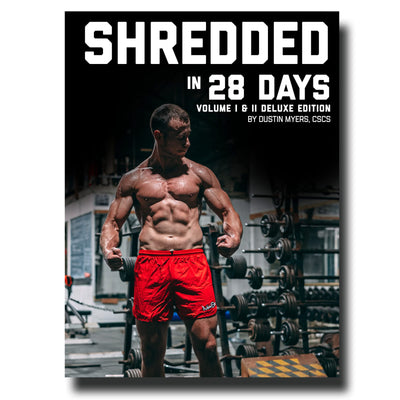Coach Myers Keys to Eating for Performance
Coach Myers Keys to Eating for Performance

Two questions I get asked on a regular basis:
-How are you able to train so often and so hard at your age (39)?
-How can you “diet” and still have energy to do cardio every day?
The answer to both of these questions is a simple one: my nutrition is the key. Rather than just rattle off a meal plan I’m going to share with you my keys to eating for performance. This isn’t a template to simply lean up or loose weight, the following rules are what I follow to stay lean year round, workout 2-3 times every day, and continue to get stronger and faster even as I am closing in on middle age. Going for a jog everyday is one thing, being able to run sprints with a bunch of D1 athletes and still lift heavy in the same day is another.
1. Only Fats and protein for breakfast - only fats if also trying to lean up
Keep the carbohydrates out of your morning routine. Oatmeal? Nope. “Whole wheat” stone ground sprouted organic bagel? No way. By breaking the fast with carbs will have a negative impact on your blood sugar and slow down your metabolism. Whole eggs and avocado are a perfect choice. I typically do my fist workout “coco-fasted”, coffee and coconut oil, and then eat 4 eggs and avocado post workout #1.
2. Keep carbohydrates low and only eat them post workout
I typically only eat complex carbs once a day or every other/every third day depending on how I’m feeling. When I do eat carbs - quinoa, brown rice, sweet potatoes, etc. - I eat them after my hardest workout of the day to replenish my glycogen.
3. Keep fruit in your diet but only post workout
The simple sugar in an apple or grapefruit is perfect to help your muscles recover for your next workout. Eat fruit at least once a day, preferably after each workout.
4. Keep fat intake high - avocado, nuts, olive oil, coconut oil, whole eggs, beef, salmon
Our bodies are designed to run off of fat as the primary energy source, not carbohydrates. Give your body the fuel it needs to train by keeping your fat intake high. I shoot for at least one high fat source per meal.
5. Eat loads of green vegetables for fiber and nutrients
Don’t skip on your veggies! The problem with many lower carbohydrate diets is that people limit their intake of fibrous vegetables.
6. 1 gallon or more of water per day
Unless you have been living under a rock you should already be doing this. Hydration is key, and dehydration is a major cause of unwanted soreness and underperformance.
7. 1 scoop Max Effort Post during the workout, and another scoop following training.
BCAAs and Glutamine are the only two supplements that I have taken consistently year round for the past 20 years, and I believe it’s a major factor in my recovery and performance. BCAAs and Glutamine are some of the essential building blocks your body uses to rebuild and repair muscle tissue, and Glutamine plays a major role in driving water back into the muscle. I take 1 scoop (10gr BCAA and 5gr Glutamine) and mix it with 20oz of water to drink during my workout, and repeat the same thing immediately after training. So even when I train coco-fasted I’m getting 14gr of fat (1T Coconut Oil) before my workout, 15gr of aminos during training and another 15gr of aminos as soon as I finish. Who needs oatmeal with all of that clean fuel?!?
Remember, everyone’s body is different and this is what I’ve found works best for me over the years. The nutrition plan that is best for you is the one you can actually stick to. I do know this - by following these 7 guidelines I feel great and am always up for any type of workout…even if I have trained twice today already.



Leave a comment